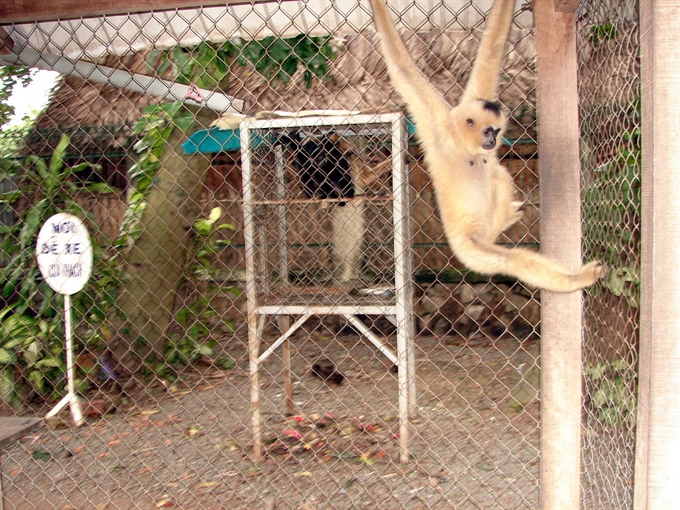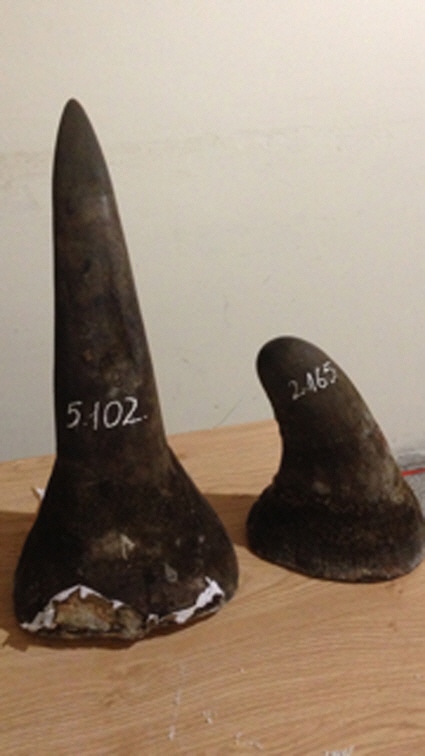 Environment
Environment

Following increasing criticism of Việt Nam’s failure to crack down on wildlife crime, Prime Minister Nguyễn Xuân Phúc issued a new directive earlier this month instructing authorities and law enforcement agencies across the country to take urgent measures to combat the illegal trade in wildlife.
 |
| A rare kind of gibbon is taken care of at the Bình Dương Forest Management Department after being rescued from an illegal wild animal-raising enterprise in the province. The enterprise owner failed to show any papers related to its origin. – VNA/VNS Photo Dương Chí Tưởng |
HCM CITY — Following increasing criticism of Việt Nam’s failure to crack down on wildlife crime, Prime Minister Nguyễn Xuân Phúc issued a new directive earlier this month instructing authorities and law enforcement agencies across the country to take urgent measures to combat the illegal trade in wildlife.
According to the directive, the Government is aware that its current approach has not stamped out the illegal trade and that “illegal activities, including processing, handicraft making and trading, and openly selling wildlife products such as ivory and rhino horns are still taking place.”
The prime minister has urged provincial and city authorities to scale up their efforts to tackle wildlife crime by instructing relevant agencies to “monitor, investigate and apply serious punishment to those involved in illegal trade of ivory and rhino horn, as well as inspect craft villages, processing workshops, souvenir shops in tourist spots, airports, seaports, and traditional medicine shops.”
The directive also makes it clear that the days of impunity for wildlife criminals must come to an end.
It instructs the Ministry of Police and other concerned ministries to “organise campaigns to destroy trans-border organised crime groups, who are involved in trading, storing, trafficking, importing/exporting illegal specimens of wildlife species, especially ivory and rhino horn.”
The police are told to also “cooperate with other agencies to monitor and severely punish activities related to retail selling, online trade, advertisement and illegal uses of ivory and rhino horn in domestic markets.”
In another welcome move, the PM has ordered that the results of the inspections, monitoring exercises and prosecutions must be published in the media. This is particularly significant since Việt Nam has reported no successful prosecutions of rhino horn traffickers despite the widespread evidence of illegal trade.
The unexpected directive comes just a week before 181 nations gather in South Africa for the world’s most important wildlife trade meeting – the 17th Conference of the Parties (CoP17) to the Convention on International Trade in Endangered Species of Wild Fauna and Flora (CITES) – where Việt Nam’s lack of progress on tackling wildlife trafficking will be in the spotlight.
It also comes just days after the WWF called on Việt Nam to take concrete steps to tackle illegal rhino horn trade or face trade sanctions under CITES.
"This directive shows that the Vietnamese Government is aware of the seriousness and scale of the illegal wildlife trade in the country and admits that much more needs to be done to tackle it," Trần Lê Trà, policy manager, WWF–Việt Nam, said.
"It is critical that responsible authorities act upon this directive and immediately ramp up efforts to crack down on illegal wildlife markets and prosecute the traffickers."
There are concerns that this directive might turn out to be stronger on paper than in practice, especially as a similar announcement was made in 2014 but with little effect.
But the new directive stresses that authorities will be held accountable for their action – or lack of it. According to the announcement, “Heads of Party Committees and local governments are responsible and accountable to the prime minister if violations of regulations on wildlife are discovered.”
The decision also comes just days after it was announced that the Wildlife Justice Commission would hold public hearings in November following its investigations into the illegal wildlife trade in Việt Nam.
The commission took the decision to hold the hearings because the authorities in Hà Nội had made no effort to act on the evidence that the WJC had presented to them.
"The prime minister has shown that there is political will in Việt Nam to tackle wildlife crime: the world will now be watching to see how urgently and effectively the authorities implement this important directive," Elisabeth McLellan, WWF Head Wildlife Crime Initiative, said.
While this directive is a significant step in the right direction, Việt Nam still needs to prove that it is serious about tackling wildlife crime, particularly the illegal rhino horn trade.
So WWF says it will still be pushing for Việt Nam to agree to concrete, time-bound actions at CITES CoP17 or face the threat of sanctions. — VNS
Education for Nature-Vietnam to make proposals at CITES conference
The Education for Nature - Vietnam (ENV) group has called on member countries of the Convention on International Trade in Endangered Species of Wild Fauna and Flora (CITES) to vote against Swaziland’s proposal to legalise the rhino horn trade.
Ahead of the conference of CITES member countries in Johannesburg, South Africa, from September 24 to October 4, the ENV also opposed caging tigers and recommended delegates vote to increase the protection for pangolins.
Vũ Thị Quyên, director of ENV, hoped that the right decisions would be made at the conference to protect endangered animals.
ENV backed the proposal to raise the protection level for pangolins from Appendix II to Appendix I of CITES.
Putting the protection of all the eight species of pangolins at the same level as tigers combined with the upcoming modified Law on Criminals would allow Vietnamese law-enforcement agencies to impose punishments related to pangolin trading, the centre said.
 |
| Rhino horns that are evidence in a wildlife trafficking case, were confiscated by the HCM City Customs, in co-ordination with the Taân Sôn Nhaát Border Gate Police. — VNA/VNS Photo |




